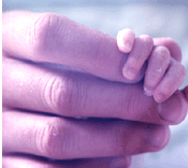| Miscarriage Miscarriage is the term health care providers use to describe the loss of pregnancy from natural causes before the 20th week of pregnancy. Most miscarriages occur very early in pregnancy, in some cases before a woman even knows she is pregnant. Researchers estimate that, among women who already know they are pregnant, nearly 15 percent will have a miscarriage.
There are many different causes for miscarriage, some of them known and others unknown. In most cases, there is nothing a woman can do to prevent a miscarriage. Having a miscarriage does not mean that a woman won't become pregnant again, or that she will not have normal pregnancies in the future. And, for most women, miscarriage is not a sign of a larger health problem.
Having a miscarriage can be devastating to a woman and her family. A woman or family who is having trouble coping with the loss of a miscarriage should ask a health care provider. |
| NICHD Research on Miscarriage The NICHD supports and conducts research on the causes of miscarriage in hopes of finding ways to prevent women from having them. For instance, NICHD-supported researchers recently found that women with a disorder called Polycystic Ovary Syndrome (PCOS) are three times more likely to miscarry during the early months of pregnancy than women who don't have PCOS. Women with PCOS often have great difficulty getting pregnant naturally.
Research has found that women with PCOS also tend to have a condition called insulin resistance, which means their bodies have trouble using the insulin they make to get energy from their cells. Insulin resistance often occurs before someone develops diabetes. To treat this insulin resistance, researchers had been prescribing a drug called metaformin. What they found was that metaformin not only reduced insulin resistance, but it also brought about changes to the uterine lining that could help women with PCOS get pregnant and reduce the risk of miscarriage during their first trimester (the first three months) of pregnancy. Studies are now underway to confirm the positive effects of the using metaformin in women with PCOS, and to evaluate the safety of taking the drug throughout pregnancy. The NICHD's Reproductive Sciences Branch, through its Reproductive Medicine Network (RMN) is currently conducting a clinical trial for the treatment of infertility related to PCOS, using metaformin. The RMN Web site provides more information on this trial and on the RNM itself.
Other NICHD-supported research is trying to learn more about repeated miscarriage. Researchers estimate that between 1 percent and 2 percent of women in the United States has more than one miscarriage without a known cause. Women who experience repeated miscarriages may undergo expensive and lengthy tests to try to identify a cause, but often get no answers. NICHD researchers, examining the vulva of these women, have found that many of them share a genetic mutation, or change. This mutation, on one of the X chromosomes, was found in nearly 15 percent of women who had a history of repeated, unexplained miscarriage. If this genetic mutation is confirmed as a cause of repeated miscarriages, researchers may be able to develop a simple blood test that could predict a woman's chances of having a miscarriage in future pregnancies. For more information on NICHD-supported research on miscarriage, read the Institute's news releases on miscarriage. The National Library of Medicine provides additional information on pregnancy loss, which includes miscarriage. For more information, visit the Medem™ Website and do a search for "recurrent miscarriage" in the medical library. Stillbirth Stillbirth is the term health care providers use to describe the loss of a pregnancy after the 20th week of pregnancy, due to natural causes. According to national statistics, stillbirths occur in nearly one in 200 pregnancies in the United States every year.
Stillbirth can occur before delivery, or as a result of complications during labor and delivery. In at least half of all cases, researchers can find no cause for the pregnancy loss.
In some cases of stillbirth, the mother may notice a decrease in the movement or kicking of the fetus. In these cases, the health care provider uses an ultrasound, a machine that uses sound waves to create a picture of the fetus, to learn more about its health. If you are pregnant and have concerns about stillbirth, ask your health care provider if there are special ways he or she wants you to track movement.
Stillbirth can be devastating to a woman and her family. If you or your family are having trouble coping with the loss of a stillbirth, please talk to your health care provider.
In spite of how often stillbirth occurs, and how emotionally painful it can be, little research has been done on this type of pregnancy loss. To encourage more research on stillbirth, the NICHD is supporting a new research initiative, Research on the Scope and Causes of Stillbirth in the United States. Through this effort, the NICHD will create a network of research sites whose sole focus will be on understanding stillbirth, its features, its causes, and its effects on a woman's uterus. Patients in this network will include women from a variety of ethnic and economic backgrounds, to provide a clearer picture of this problem. Through this initiative, the NICHD hopes to support work that may some day be able to predict and prevent stillbirths.
The March of Dimes Birth Defects Foundation offers some patient information about stillbirth. |
